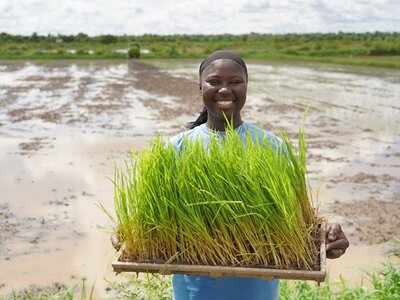Gambia
- 53%
- of the population live in poverty
- 29%
- out of the people (2.4 million) are food insecure
- 24%
- of households have inadequate food consumption
The Gambia faces high levels of food insecurity and malnutrition, particularly among women, young people and children. This is driven by multiple and diverse factors.
Agriculture contributes 25 percent of the country’s GDP, employs 70 percent of the
population and is the source of livelihoods for 80 percent of rural inhabitants.
However, it covers less than 50 percent of food requirements, meaning the country relies significantly
on imported food. This leaves it vulnerable to price volatility, with high levels of food Inflation creating constant challenges for the poorest people.
Agricultural productivity is worsened by climate-related shocks that damage crops and land, and pose a serious threat to livelihoods.
WFP has been present in The Gambia since the 1970s, providing support including food assistance, nutrition services and climate-resilience activities.
What the World Food Programme is doing in the Gambia
-
Crisis response
-
WFP works in partnership with The Government to provide food and nutrition assistance to those affected by climate shocks, including children aged 6 to 59 months as well as pregnant and breastfeeding women and girls.
-
Home-grown school feeding
-
Tackling malnutrition
-
Smallholder agricultural market support
-
Capacity strengthening
-
Social protection
Gambia news releases
Go to pagePartners and donors
Find out more about the state of food security in Gambia
Visit the food security analysis pageOperations in Gambia
Contacts
Office
UN House, Koffi Annan Street, Cape Point, Banjul, Islamic Republic of the Gambia.
Banjul
Gambia







